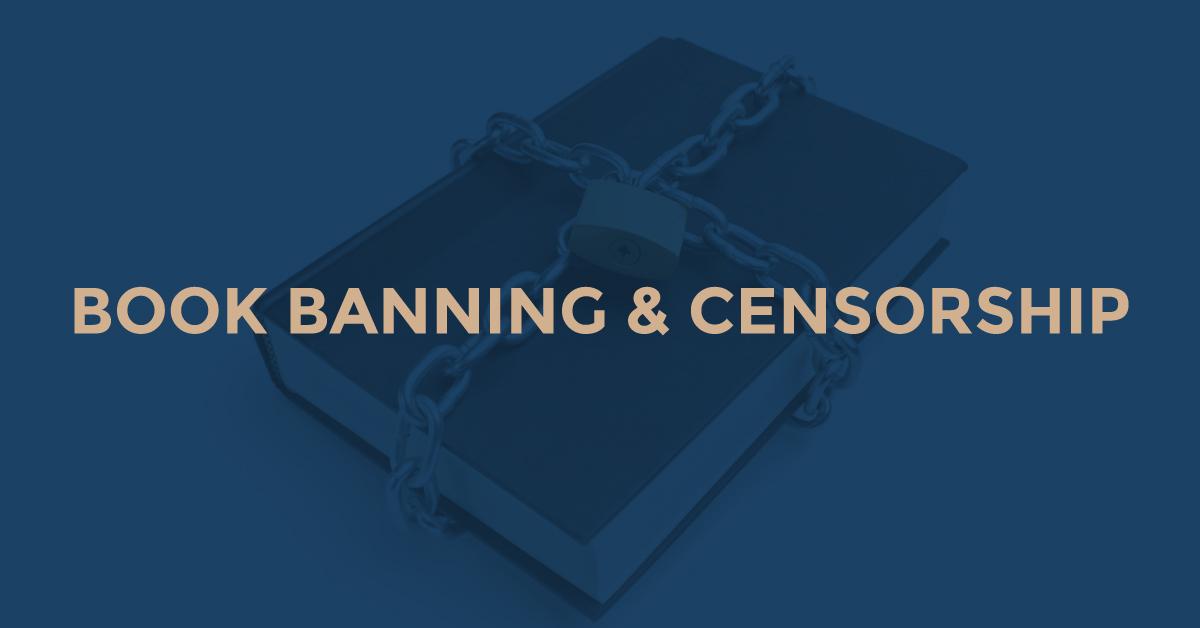
Book banning and censorship have existed in this country since before the Constitution. The Puritans banned Thomas Morton’s New English Canaan in 1637, for example.
The recent and highly politicized drive to remove certain volumes from school libraries has taken censorship to a new and troubling level.
While Morton’s book was banned for criticizing Puritan customs, today, many of books are being targeted because they address sexual and racial identity. For example:
- A bill was introduced in Oklahoma’s State Senate that would prohibit public school libraries from stocking books that discuss sexual activity, sexual identity, or gender identity.
- A Wyoming county prosecutor considered filing charges against library employees for stocking books like Sex Is a Funny Word and This Book Is Gay.
- Earlier this year, the mayor of Ridgeland, Mississippi, withheld funding from the local library system and said he would not release it until books with LGBTQ themes were removed.
- A book that has been most vigorously targeted is The 1619 Project, a bestseller about slavery in America that has drawn support and praise from historians and black community leaders.
- Texas State Representative Matt Krause recently placed over 800 books on a watch list, a lot of which are about race and LGBTQ issues.
- The conservative nonprofit group Moms for Liberty are loudly campaigning for anti–critical race theory and anti–social-emotional learning in public schools.
Books have been banned in U.S. libraries and classrooms before, but the decisions were largely made at the local level. Today, we see a national political movement. This national movement is troubling because it targets young readers, especially LGTBQ youth, identify with the content or characters in these books.
Just Like in the Past, Only Worse
When it comes to book banning drives, teachers, librarians, and free speech advocates say it isn’t just their frequency that has changed, but also the tactics behind them and the venues where they occur. In recent years, Conservative groups, fueled by social media, have taken the challenge to courthouses, law enforcement, and political campaigns.
Efforts to bring criminal charges against librarians and educators who make these books available have largely failed so far, as law enforcement officials have not found any reason to conduct criminal investigations. The courts have also generally held that libraries should not remove books from circulation. Despite this, librarians say that just the threat of having to defend against charges can deter them from stocking the books in the first place.
Book Banning and the Constitution
Where does the law stand on all this? Can lawmakers remove books from school shelves? What about parents? Can the schools and even students say no?
At the moment, local libraries and boards of education may only remove books from their shelves under certain circumstances, such as outdated content or damage to the volumes themselves. Removing a book based on its content could be a violation of the First Amendment: the U.S. Supreme Court has ruled that students have the same First Amendment rights as anyone else and removing a book based on content is unconstitutional censorship and an “official suppression of ideas.”
The removal of books because they discuss controversial subjects is viewpoint-based exclusion – “a form of speech suppression so potent that it must be subject to rigorous constitutional scrutiny.” Matal v. Tam, ___U.S.___, 137 S.Ct. 1744, 1765 (2017) (Kennedy, J., concurring). Banning books containing material about LGTBQ issues – or, worse, protrary LGTBQ students in a positive light – impedes students from accessing and responding to these materials and from participating fully in their education. Advocates of book bans seek to effectively eject these materials from schools and the national conversation based solely on their viewpoints, simply because some people find the subject objectionable. This is intolerable under the First Amendment. See, e.g., United States v. Playboy Entm’t Grp., Inc., 529 U.S. 803, 818 (2000) (“It is rare that a regulation restricting speech because of its content will ever be permissible.”). Having created a public library precisely for the free exchange of ideas, schools cannot constitutionally close it to those who might express disagreement or another view. See Bd. of Cty. Comm’rs v. Umbehr, 518 U.S. 668, 680 (1996) (noting that “the government has no legitimate interest in repressing” “ordinary citizens[’] . . . viewpoints on matters of public concern”); Lamb’s Chapel v. Ctr. Moriches Union Free Sch. Dist., 508 U.S. 384, 394 (1993) (“[T]he First Amendment forbids the government to regulate speech in ways that favor some viewpoints or ideas at the expense of others.”).
Pressure and Resistance
Although most of the pressure on school boards stems from parents and community members who object to books with racial, sexual, LGBTQ-affirming themes, there has been pushback from individuals who disagree.
One 17-year-old student, Jack Petocz, organized a protest against book bans. He told the New York Times that removing books about racism and LGTBQ characters was discriminatory and potentially harmful to students who are part of these communities.
Texas school librarians have responded by creating a new group called #FReadom to combat the problem. During an Urbandale, Iowa, school board meeting, a group of students and parents defended the books in the school library.
Ultimately, the idea that students can be protected from unpopular ideas by simply banning books is a bit unrealistic. When those books deal with racial, gender, or sexual identity, suppressing them can send a message that does more harm than good.
At Engel & Martin, LLC, we understand the devastating impact of discrimination on all levels, including the banning of books that highlight unpleasant truths like racism or validate the experiences of young LGBTQ people. We have brought First Amendment cases decisgned to protect the rights of individuals. While society may have come a long way since Thomas Morton outraged the Puritans, in other respects, we still have a long way to go. If you find yourself in a situation where you are denied free speech or other First Amendment rights, contact us immediately.
